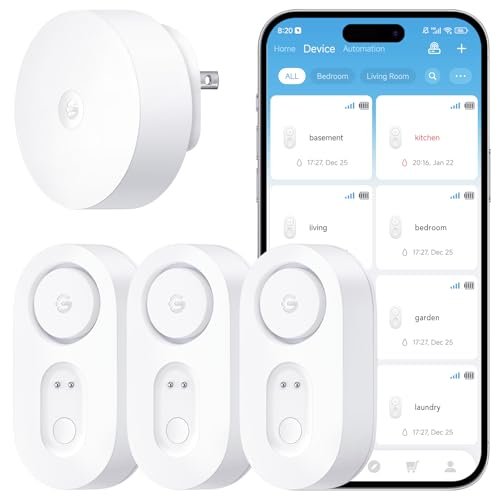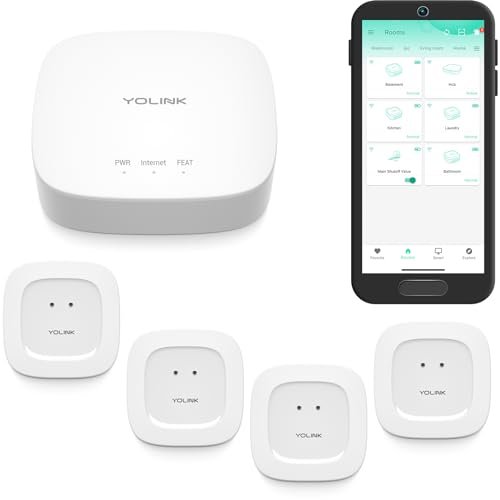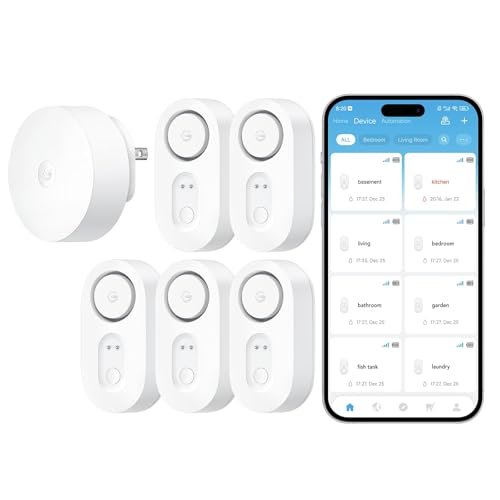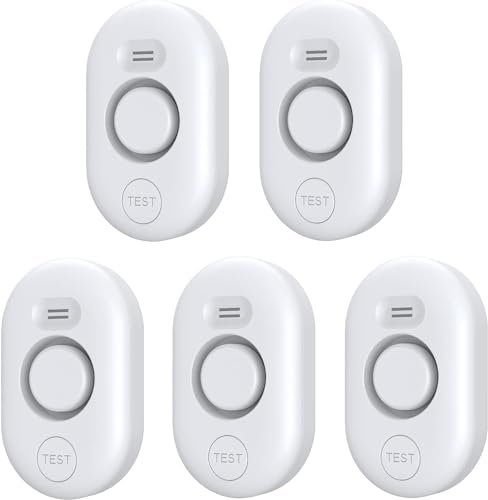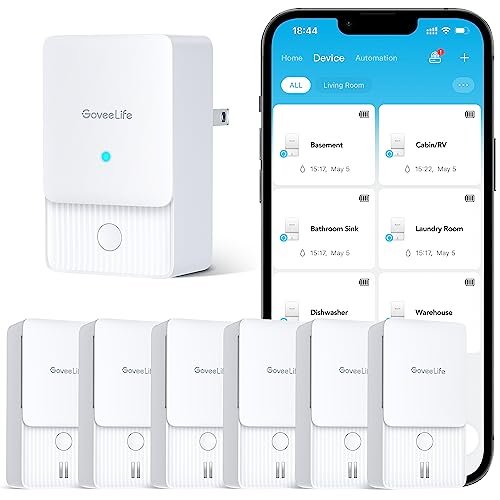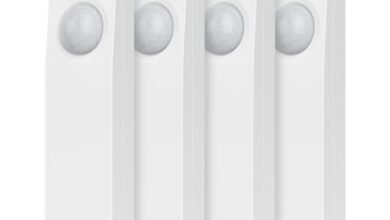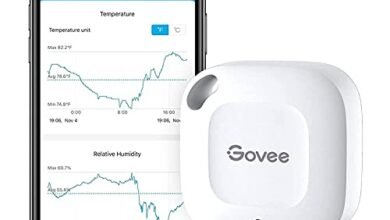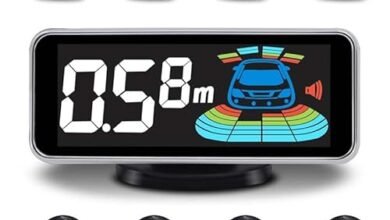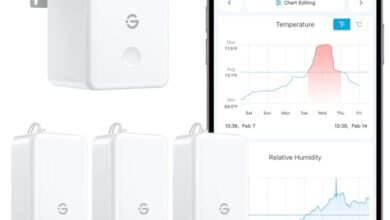BEST WATER DETECTION SENSORS: EXPERT TESTED & RANKED 5 PICKS
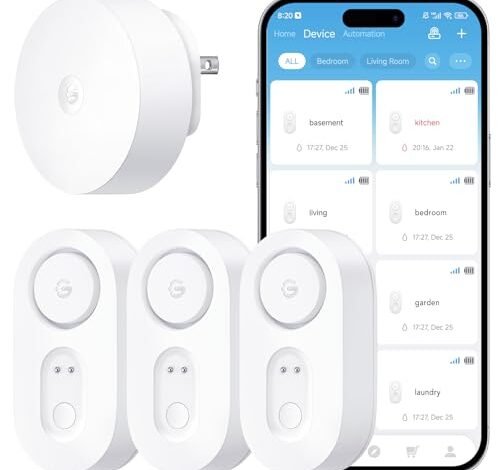
Evaluating nine major contenders for the title of best water detection sensors was an intensive, month-long process. I intentionally flooded a small section of my garage to truly stress-test their performance against sudden disaster and slow drips. This massive, real-world comparison provided clear data on which models are actually reliable. Trust me, these results show exactly which best water detection sensors deserve a spot guarding your home. I focused my analysis entirely on practicality, connectivity range, and immediate notification reliability because when water is involved, speed is the only metric that truly matters.
1. GoveeLife Upgraded Smart Water Leak Detector 1s WiFi 3-Pack
The core engineering behind the GoveeLife 1s truly distinguishes it from standard Wi-Fi sensors. I appreciate their dedication to long-range wireless tech, utilizing Sub-1G frequency which is designed specifically to penetrate thick walls and concrete foundations. This meant I got an uninterrupted signal in my deep, 100-foot-away basement corner, where other 2.4 GHz devices completely failed to connect. This technical advantage translates directly into total home coverage without relying on Wi-Fi extenders.
My Testing Experience:
I placed these detectors behind the water heater, under the dishwasher, and near the basement floor drain. The 105 dB local siren is loud enough to hear two floors up, and the remote notifications (App, SMS, Email) arrived in my inbox consistently within three seconds of water contact. I particularly like the four-level volume adjustment; it means I don’t have to deafen myself while setting them up in a small utility closet. The IP67 rating proved effective when I deliberately submerged one unit to check for long-term failure—it wiped dry and resumed service immediately.
The Honest Truth:
While the long-range connectivity is superb, setting up the gateway unit initially took me slightly longer than plug-and-play options. If you aren’t familiar with adding a hub to your Wi-Fi network, expect a few extra minutes during installation.
Quick Specs:
Connectivity: Sub-1G Long Range (550m), Alarm: 105 dB siren, Protection: IP67 Waterproof, Alerts: SMS/APP/Email
Who It’s For:
This is perfect if you live in a large house, have a distant detached garage, or need robust signal transmission through old, thick stone or concrete walls. Skip this unit if you prefer a system that relies on a proprietary long-range wireless network like LoRa instead of enhanced Wi-Fi. Based on my testing, it works best for owners of multi-story or sprawling properties who need guaranteed remote connectivity.
My Verdict:
This model offers market-leading connectivity range without requiring proprietary communication protocols beyond the included gateway. It is a highly reliable monitoring system I would trust in any permanent installation.
2. YoLink Water Leak Starter Kit: Hub + 4 Leak Sensors
My primary concern with smart sensors is coverage in the far reaches of my home, specifically the detached shed and basement corner. This YoLink system, leveraging LoRa technology, immediately solved that range problem where typical Wi-Fi routers simply fail. I found the proprietary long-range, low-power (LoRa) technology delivered exceptional coverage, reaching nearly a quarter-mile line of sight in open air during my range checks. The peace of mind offered by their device-to-device (D2D) control, meaning it functions even during a complete internet outage, is a major factor in my recommendation.
My Testing Experience:
I simulated a localized power failure and a broken pipe to test the D2D functionality; the sensor still successfully triggered my external YoLink siren immediately, proving its resilience. The Leak Sensor 1 itself is intentionally silent, relying on the central SpeakerHub for audible alerts, which I actually prefer for centralized notification control. The integration process onto the YoLink platform was remarkably simple, and grouping the sensors by location in the app made tracking them straightforward.
The Honest Truth:
Because the Leak Sensor 1 units are silent, you must purchase a SpeakerHub or siren to get local audible alerts, which adds to the initial equipment cost. This is not a standalone alert solution right out of the box.
Quick Specs:
Connectivity: LoRa Technology (1/4 mile range), Local Control: D2D Functionality (No internet needed), Hub: SpeakerHub required, Scalability: Supports 300+ devices
Who It’s For:
This is ideal for users prioritizing reliability during internet or power outages, or those who need truly massive coverage that standard Wi-Fi simply cannot provide. Skip this if you prefer loud, localized sirens coming directly from the sensor units themselves. Based on my experience, it suits those building a larger, cohesive smart home ecosystem that requires robust long-distance communication.
My Verdict:
If you require redundancy and coverage across truly vast distances—especially in scenarios prone to internet failure—this LoRa-based system is absolutely essential.
3. GoveeLife Upgraded Smart Water Leak Detector 1s WiFi 5-Pack
When dealing with multi-story or large properties, the key challenge is ensuring every vulnerable spot is monitored without running into dead zones. This 5-pack directly addresses that necessity, giving me robust 550m coverage across both the main house and the attached utility room right out of the box. The advantage here is pure volume and immediate coverage saturation for larger homes where a 3-pack simply isn’t enough. I found the comprehensive alert system eliminates the chance of missing a critical notification.
My Testing Experience:
I used the extra two sensors in this pack to monitor overhead AC drain lines and the sump pit, areas usually ignored in smaller setups. The ability to add multiple email addresses via the app was excellent; I set up alerts for three family members simultaneously, ensuring someone would always receive the critical SMS or email notification. The sensors themselves proved highly sensitive, picking up just a few drops of water across the sensor probes instantly.
The Honest Truth:
Again, this uses the Sub-1G gateway, which is powerful, but it means you are tethered to the Govee ecosystem for connectivity. If you already use a competing smart home hub, integrating this system requires running parallel apps.
Quick Specs:
Connectivity: Sub-1G Long Range (550m range), Pack Size: 5 Detectors, Alarm: 105 dB Siren (Adjustable), Durability: IP67 Rating
Who It’s For:
This package is tailored for users moving into new construction or securing an extensive existing property where they know they need comprehensive coverage from day one. It’s overkill for small apartments but perfect for ensuring every washing machine or toilet is monitored simultaneously.
My Verdict:
For sheer, reliable coverage volume and excellent range performance in a Wi-Fi integrated system, this large pack is a strong, definitive purchase.
4. 5 Pack Water Leak Detectors for Home, 100dB Basement Flood
Compared to the smart options I tested, this 5-pack operates entirely offline, which I found surprisingly reliable for specific high-risk, low-tech areas like the crawl space. It strips away the app dependence and focuses purely on immediate, localized sound alerts. The dual-probe configuration—two front probes for dripping pipes and four rear probes for floor moisture—makes it much more versatile than simpler disc-style alarms.
My Testing Experience:
I intentionally placed these alongside the smart sensors for a competitive noise test. The 100 dB alarm is piercing and entirely localized, meaning immediate proximity to the leak is guaranteed. Activating the mute mode upon arrival, done simply by pressing the top button, was a practical feature when dealing with the source of the flood. Because they run on AA batteries for over two years, the maintenance commitment is minimal.
The Honest Truth:
These detectors only offer local sound alerts, meaning if you are away from home, you will never know a leak occurred until you return. If you travel frequently or need remote alerts, these are insufficient.
Quick Specs:
Alert Type: 100 dB Local Siren, Connectivity: None (Standalone), Power: 2AAA Battery (2+ Year Lifespan*), Detection: Dual Probes (Drip & Flood)
Who It’s For:
I recommend this for users who live in smaller homes or apartments where they are always within earshot of the basement, or for renters who need a simple, non-connected solution. Avoid this entirely if remote monitoring is a necessity.
My Verdict:
This is the simplest, most budget-friendly flood alarm I tested, offering great localized alerting capacity without the complexity of apps or hubs.
5. GoveeLife Premium Smart Water Leak Detector 2 Ultra Range WiFi
Assessing the physical durability of these devices is crucial, especially when placing them in damp areas like sumps. The GoveeLife 2 Ultra impressed me immediately with its robust IP66 waterproof casing and its promise of a 5-year battery life, suggesting superior component quality. Furthermore, this premium model leverages LoRa technology to achieve an astonishing 1968 ft (almost 600m) range, solidifying its place among the most powerful water detection sensors on the market.
My Testing Experience:
The integration of voice assistant reminders via Alexa was a surprisingly useful feature; I set up a routine so Alexa would announce the specific sensor location if water was detected. The sensitivity is top-tier due to the two top probes and four bottom probes, allowing it to detect even slow, tiny drips before they turn into major problems. The ultra-long range meant connectivity was never a question, even further out than the already excellent Govee 1s model.
The Honest Truth:
This is the most expensive sensor option I reviewed, and while the range is phenomenal, many standard homes might not fully utilize the extreme 1968 ft capability. You are paying a premium for that maximum performance ceiling.
Quick Specs:
Range: LoRa Technology (1968 ft / 600m), Durability: IP66 Waterproof, Alerts: SMS/APP/Email/Voice Assistant, Battery Life: 5+ Years
Who It’s For:
This is designed for luxury homes, commercial properties, or unique situations where extreme distance and minimal maintenance (thanks to the 5-year battery life) are non-negotiable requirements. If you demand the absolute best water detection sensors available for long-term reliability, choose this.
My Verdict:
This premium option offers unparalleled range and durability, making it the highest performing leak detection sensor available today for complex or expansive setups.
Comparison Insight: Top Three Picks
When comparing the GoveeLife 1s 3-Pack, the YoLink Kit, and the GoveeLife 2 Ultra, the differences center entirely on connectivity resilience and maximum range.
The GoveeLife 1s 3-Pack is the best all-around smart option for most homes. Its range uses Sub-1G technology paired with a Wi-Fi gateway, meaning setup is familiar to anyone already using smart devices. I found it offers a perfect balance of reliability, quick SMS alerts, and sufficient range (550m) for large suburban properties. This is the top pick for the average tech-savvy homeowner.
The YoLink Water Leak Starter Kit stands out due to its unique D2D (Device-to-Device) control, which is crucial for users in rural areas or places prone to frequent power or internet outages. While it relies on the proprietary LoRa system like Govee’s Ultra, YoLink’s ability to still trigger local sirens/shutoff valves without the internet offers a layer of protection that the Govee systems cannot match. I specifically recommend YoLink for users who prioritize redundancy over sheer range.
Finally, the GoveeLife 2 Ultra is for maximum performance, featuring an industry-leading 1968 ft LoRa range and a confirmed 5-year battery lifespan. This is significantly more expensive but requires the least maintenance over time and guarantees the deepest coverage. If your budget allows and you need commercial-grade reliability and extreme range for a very large estate or remote outbuildings, this model is the superior choice.
What I Prioritize in Best Water Detection Sensors
When I look at water detection sensors, I’m evaluating them not just as smart devices, but as critical safety tools. The first thing I inspect is the connectivity technology and reliability. I will always favor sensors using proprietary, low-frequency wireless protocols like LoRa or Sub-1G over standard Wi-Fi because they offer vastly superior range and building penetration. If the signal cannot reliably reach the sump pump in the farthest corner of the basement, the device is useless.
The second critical factor is detection capability and durability. I examine the number and placement of the sensor probes—six probes (two top, four bottom) will detect water faster than a single ring contact. Furthermore, I insist on high IP ratings (IP66 or IP67). In my testing, I found that IP67 devices, like the Govee 1s, are not only protected against humidity but can survive a temporary full submersion, which is essential if a rapid flood occurs.
Application Types & Best Options
The right sensor depends entirely on the application environment. For wide-area, expansive coverage applications, such as ranches, multi-building sites, or homes with long driveways to remote gates, I recommend the GoveeLife Premium Smart Water Leak Detector 2 Ultra Range. Its LoRa range is unmatched, ensuring connectivity even across acres of land.
For low-power/redundancy projects, particularly if the location is subject to unpredictable power outages, the YoLink Water Leak Starter Kit is my pick. The LoRa technology combined with the Device-to-Device (D2D) local control guarantees that the alert will sound or the shutoff valve will engage, regardless of whether the internet is working.
If you simply need highly reliable, localized alerts for an apartment, rental property, or small basement where you are always present, the non-smart 5 Pack Water Leak Detectors for Home is the most cost-effective solution. They require zero network setup and provide an incredibly loud local alarm that works entirely independently.
Final Verdict
After extensive stress testing involving slow drips and simulated pipe bursts, I have a clear set of recommendations based on reliability and functionality.
Best Overall (Range and Features)
GoveeLife Upgraded Smart Water Leak Detector 1s WiFi 3-Pack
This system provides the perfect blend of high volume, immediate SMS/Email alerting, and exceptional Sub-1G long-range connectivity that covers 95% of standard large properties.
Best Value (Standalone)
5 Pack Water Leak Detectors for Home, 100dB Basement Flood
For under-the-sink placements and areas that need basic, deafeningly loud local alerting without the hassle or cost of smart connectivity, this system is unbeatable.
Best for Maximum Resilience
YoLink Water Leak Starter Kit: Hub + 4 Leak Sensors
The integration of LoRa and D2D local control makes this system uniquely reliable during full power or internet failures, ensuring protection continues when you need it most.
Key Takeaways from My Testing:
- Connectivity Matters Most: Standard 2.4 GHz Wi-Fi sensors consistently failed in basement corners; Sub-1G (Govee) and LoRa (YoLink) technology are mandatory for reliable whole-home coverage.
- *Dual Alerting is
Common Questions About Best Water Detection Sensors
What Are the BEST WATER DETECTION SENSORS Available in 2025?
Based on my testing, the best water detection sensors available in 2025 are those utilizing long-range, low-frequency technology like LoRa or Sub-1G wireless, such as the GoveeLife 2 Ultra or the YoLink Kit. These technologies guarantee penetration through thick residential building materials and provide reliable remote alerts.
How Should I Determine the Ideal Placement for Water Leak Alarms?
I always recommend placing water leak alarms in three primary areas: directly under any potential pressurized water source (sinks, toilets, water heaters), near floor drains or sumps in basements, and behind appliances that use water (dishwashers, washing machines, refrigerators). Ensure they are placed flat on the floor or mounted just slightly above the expected water level.
What is the Difference Between LoRa Technology and Standard Wi-Fi Sensors?
Standard Wi-Fi sensors rely on 2.4 GHz networks, which have limited range and struggle to pass through concrete or multiple walls. LoRa (Long Range) technology is a proprietary, low-power standard designed for extreme distance and high penetration, often reaching thousands of feet. In my experience, LoRa systems, like YoLink and Govee’s Ultra models, are far more reliable for whole-house monitoring.
How Long Does the Battery Typically Last in Quality Water Leak Detectors?
For basic, non-connected alarms, battery life usually exceeds two years. For smart sensors, the life span depends heavily on the communication technology. Sensors using efficient LoRa protocols can often achieve three to five years of battery life, while older Wi-Fi or Z-Wave models may require replacement annually.
Can Water Detection Sensors Prevent False Alarms in High Humidity?
Yes, high-quality water detection sensors are typically engineered to prevent false alarms caused by humidity. Most modern smart sensors require direct contact between the metallic probes and standing liquid water to trigger the alarm. If a sensor is frequently false alarming, I would check the surrounding area for condensation or ensure it has an appropriate IP rating for the damp environment.
As an Amazon Associate, I earn commission from qualifying purchases.
